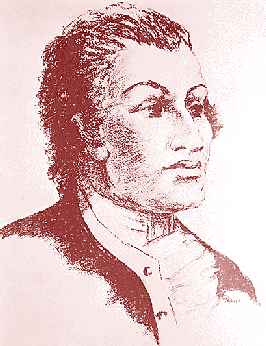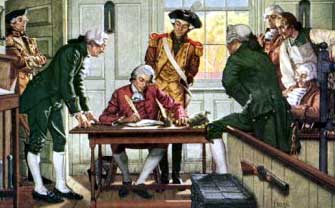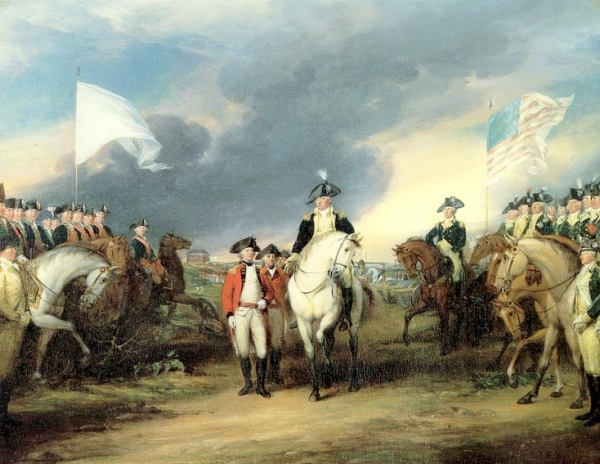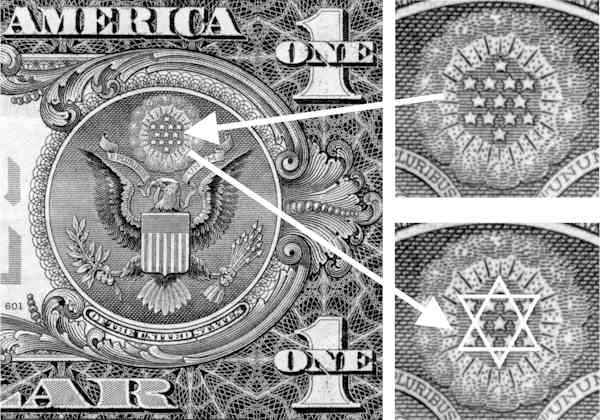 You know Hancock and Washington and Franklin and Jefferson. You might even know Greene and Knox, Henry and Hale. And we know you know Hamilton, pretty tough to escape that one these days!
You know Hancock and Washington and Franklin and Jefferson. You might even know Greene and Knox, Henry and Hale. And we know you know Hamilton, pretty tough to escape that one these days!
But it is very unlikely that you know the name Haym Solomon. This is unfortunate, because he’s the guy who arranged financing to keep the Continental Army alive during its darkest days, finding the money to keep the revolution going when many were ready to throw in the towel. He was also instrumental in the founding of the Bank of North America – the country’s first “national” bank. Solomon’s contributions to the war and the founding of the nation, though seldom discussed, were of major importance.
Haym Solomon is born to a sephardic Jewish family in Poland in 1740. He travels widely through the banking and finance capitals of western Europe, learning a thing or two and then moving on. He arrives penniless in New York City via England as the colonies are on the cusp of revolution. His expertise with money, along with his ability to converse in several European languages, makes him extremely valuable to overseas traders – he becomes a financial broker to New York’s bustling merchant community.
Solomon also establishes what will become a key friendship with Scottish maniac Alexander MacDougall, a businessman and erstwhile “politician” who was known for his aggressive disdain for class systems, hereditary titles and everything else British rule in the colonies reminded him of from back home. MacDougall, a merchant seaman by trade and privateer (pirate) during the French and Indian wars, was the street leader of the Sons of Liberty in New York. He liked to surround himself with other self-made men like Solomon and he especially liked busting heads and railing against the King.
In the summer of 1776, the Sons of Liberty attempt to burn New York City to the ground, thus denying shelter to the British army stationed there. This was General Washington’s whim and the Sons nearly destroy a quarter of all standing buildings before being rounded up. Solomon is captured by the British army in September of that year and held for 18 months, some of that time confined on a boat and tortured as a spy. He successfully convinces his captors that he is more helpful to them as a translator and is employed as a liaison between the English officers and their Hessian mercenary allies.
Solomon uses this role to access enemy military installations and to undermine German support for the Brits. He is sabotaging from the inside, talking the Hessians out of fighting for the English king. When these insurgency activities are discovered, Solomon is arrested again. This time, he pulls out a gold coin that had been sewn into his clothes and bribes a guard to let him escape. He flees to Philadelphia and arranges for his wife and son to meet him there. For the second time, Solomon has arrived in a new American city penniless and forced to start over.

By this time, the tide has turned and the Continental Army is beginning to pile up victories. The army is still, however, massively underfunded. General Washington is without readily available cash and is hamstrung by this lack of financial flexibility. He makes frequent requests to the Continental Congress to send money, but very little money comes. Into this breach steps Haym Solomon, ready to serve in the capacity in which he is best suited – as broker to the fledgling America.
Now that his merchant finance business is up and running again, Solomon begins funneling his own personal profits from the enterprise directly to the revolution. According to records of the time, he extends no-interest “loans”, many of which were never repaid, to James Monroe, Thomas Jefferson, James Madison, and even Don Francesco Rendon, the Spanish Court’s secret ambassador.
According to the Jewish American Society for Historic Preservation:
Three years after having arrived in Philadelphia, 1781, Salomon’s extraordinary abilities and multilingualism, positioned him near the center of the American Revolutionary financial heart. He became the agent of the French consul and the paymaster to the newly allied French military forces in North America. The French, Dutch (through St. Eustatius) and the Spanish governments used Salomon to broker their loans helping finance the American Revolution.
Enormous loans passing through his brokerage business were converted into desperately needed specie for the American Revolutionary government and military. Paper money was almost never worth hard gold and silver. Salomon’s fees for his brokerage services to the struggling American government were extremely modest, if there were any at all. Perversely, partly because he was a Jew, the French, Dutch, Spanish and Americans alike viewed Jews in anti-Semitic stereotypical roles. They saw Jews as Shylocks from Shakespearian imagery. They saw Jews as medieval money lenders. Ironically their bigotry greased the way for Salomon’s success.
Salomon’s brokerage business became so big that he was the largest depositor in Robert Morris’s Bank of North America.
Solomon arranges some of the most crucial loans of the war effort and, working in concert with Robert Morris – the Revolution’s chief banker – becomes central to the colonials’ eventual victory. When George Washington sees his one-in-a-million opportunity to trap and destroy Lord Cornwallis at Yorktown, it is money that is wanting and Solomon comes through. Washington can’t move his army into siege position to capitalize on Cornwallis’s historic error because an army on the march must be fed. Robert Morris turns once again to Solomon the broker, who comes up with the vital $20,000 when the Treasury itself is empty. Within a day, the French and American armies, flush with the funds necessary, make their way to Yorktown and surround the city. Cornwallis is cut off from supply lines and promptly gives up.
The war is over, the colonies have won. The painting below, by John Trumbull, depicts the surrender of Lord Cornwallis after the Siege of Yorktown:

In the 1780’s, the United States is just getting off the ground as a new nation – but it is again short of funds, having borrowed from all over Europe and from just about every merchant of renown in the colonies. Once again, Morris and the founding fathers turn to their broker. “I sent for Salomon and desired him to try every way he could devise to raise money, and then went in quest of it myself…Salomon the broker came and I urged him to leave no stone unturned to find out money and means by which I can obtain it.”
Legend has it that in the aftermath of the war George Washington asked Haym Solomon what he wanted in return for his incredible service to the nation. Solomon allegedly said he wanted nothing for himself, but for the Jewish people to be recognized in some way. Washington is said to have arranged for the thirteen stars representing the colonies on the Great Seal of the United States of America to be laid out in the shape of a Star of David.
If you look at the back of a dollar bill, it looks like this:

We are told by urban legend debunkers that this bit with the star is untrue, a myth owing to the Jews’ desire to be incorporated into the early history of the country’s founding. They are probably right, it’s way too fantastic of a story to be true, but it would be cool if it was.
Haym Solomon will attempt to rebuild his fortune once again as it becomes apparent that the loans he’d been making to early America would not be paid back anytime soon. At the outset of 1785, he dies of tuberculosis at age 44. His estate is worth $350,000 at the time of his death, a paltry total in relation to the estimated $600,000 in principle and interest owed to him, money his family will never end up seeing.
Unlike the majority of the heroes of the American Revolution we are taught about in grade school, Solomon does not originally hail from Britain or the American colonies. He is not a statesman or a soldier or a wealthy landowner turned patrician Founding Father. But without his contributions and brokering skills, Washington’s army could not have been outfitted, armed and fed. The surrender at Yorktown that ended the war may not have been possible and the founding of the nation could not have been financed in the early going.
Haym Solomon was the nation’s financier when capital was scarce, credit was tight and everything depended on the flow of funds to keep the British on the run. He was the broker who saved America.
***



